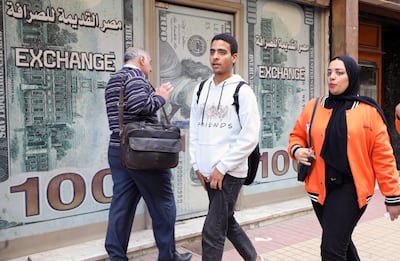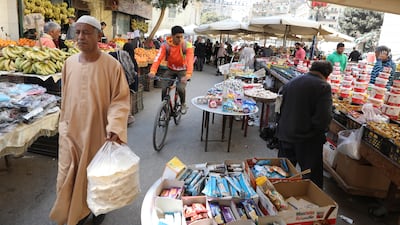Egypt’s government is proclaiming the end of an economic crisis that has plagued the country since 2022.
A strengthening Egyptian pound and falling inflation have been touted as evidence of recovery, but analysts say the picture is far more complex and that better times remain out of reach for millions financially.
Prime Minister Moustafa Madbouly declared last month that the “economic crisis is over,” saying Egypt would not seek further financing from the International Monetary Fund beyond a current $8 billion loan.
The Egyptian pound gained 5.25 per cent in value against the US dollar between January and September, while inflation – which had peaked above 35 per cent in early 2024 – is now at its lowest since early 2022.
That was when Russia invaded Ukraine, dealing a shock to the world economy and especially to countries such as Egypt that imported wheat from the war zone.
Moreover, Egypt's government has touted progress in reducing its debt-to-GDP ratio, which is projected to drop to 80 per cent by next year, down from a high of 97 per cent. Agricultural exports have also increased by more than half a million tonnes in a year.
Despite these claims of recovery, the overall picture is far murkier. Analysts argue that Egypt’s economic progress is fragile, with the government's reform programme falling short of its goals.
Mohamed Ragab, an economic analyst, told The National that while reforms have helped stabilise the economy after a financial crisis worsened by the Russia-Ukraine war, the country is effectively “back to where it was in 2016”.
That was when Egypt first turned to the IMF for assistance, with a promise to loosen state control over the economy and foster private-sector growth, objectives that have been routinely postponed until now.
While the government has made some progress, such as floating the Egyptian pound, the state's "overwhelming presence in the economy continues to repel many investors who value competitiveness”, Mr Ragab said. “A real recovery won’t start until the government steps back and allows the private sector to thrive.”
The IMF itself has expressed concern over Egypt’s slow progress on reforms. As part of a four-year $8 billion loan programme, it told Egypt to sell dozens of state and military-owned companies to attract foreign investment. However, little progress has been made and the IMF has withheld a fifth tranche of funding.
Despite the criticism, some signs of progress are undeniable. Egypt has recorded significant growth in exports, particularly in agriculture and in engineering products, where they rose by 15 per cent in the first half of this year.
Egypt's central bank has cut interest rates three times this year after maintaining a strict approach since the IMF deal began. Lending rates have dropped from 27.5 per cent to 22 per cent, making financing more affordable for businesses.
“These rate cuts have helped exporters by lowering borrowing costs, enabling them to grow production and compete more effectively in global markets,” Mr Ragab said.
However, central bank data suggests Egypt’s reliance on short-term debt instruments remains a concern. Public debt matures in just over a year and a half on average, only a slight increase on 2024.
Analysts also attribute part of Egypt’s recovery to external factors, particularly the weakening US dollar. This has strengthened the Egyptian pound and eased some pressure on the economy.
“I think the reality is that some of the recovery can be attributed to the government’s efforts and some of it is due to the dollar’s weakness,” Mr Ragab said. “The important thing now is for the government to build on this relative stability with more structural reforms to ensure a sustainable recovery.”
While the government celebrates its accomplishments, the average citizen has yet to feel the effects of the so-called recovery. Economic problems, which caused prices of basic goods doubled or tripled, still blight millions of Egyptians.
While inflation dropped to 12 per cent last month, prices for certain goods are still increasing, though at a lower rate than before.
“Essential goods are still far out of reach for most people,” Abdalla Nasef, a political analyst and host of the popular Tahrir Podcast, told The National. “The government’s declaration of victory does not reflect the reality on the ground, where citizens are struggling with stagnant wages and unaffordable prices.”
Mr Nasef argued that the government’s focus on macroeconomic indicators, such as the debt-to-GDP ratio and export growth, ignores the experience of ordinary Egyptians. He called for greater transparency, particularly regarding how the government is financing the so-called recovery.
“Citizens deserve clear answers about where the money is coming from, how it is being spent and who ultimately benefits,” Mr Nasef said. “So far, much of this recovery seems to rest on opaque deals, like the sale of state assets, raising questions about the sustainability of the government’s strategy.”
For millions of Egyptians, the economic crisis is far from over and the success of any recovery will ultimately depend on whether it improves their daily lives.
Washmen Profile
Date Started: May 2015
Founders: Rami Shaar and Jad Halaoui
Based: Dubai, UAE
Sector: Laundry
Employees: 170
Funding: about $8m
Funders: Addventure, B&Y Partners, Clara Ventures, Cedar Mundi Partners, Henkel Ventures
COMPANY%20PROFILE
%3Cp%3E%3Cstrong%3ECompany%20name%3A%3C%2Fstrong%3E%20The%20Cloud%3C%2Fp%3E%0A%3Cp%3E%3Cstrong%3EStarted%3A%3C%2Fstrong%3E%202018%3C%2Fp%3E%0A%3Cp%3E%3Cstrong%3EFounders%3A%3C%2Fstrong%3E%20George%20Karam%20and%20Kamil%20Rogalinski%3C%2Fp%3E%0A%3Cp%3E%3Cstrong%3EBased%3A%3C%2Fstrong%3E%20Hub71%2C%20Abu%20Dhabi%2C%20UAE%3C%2Fp%3E%0A%3Cp%3E%3Cstrong%3EIndustry%3A%3C%2Fstrong%3E%20Food%20technology%3C%2Fp%3E%0A%3Cp%3E%3Cstrong%3EFunding%20size%3A%3C%2Fstrong%3E%20%2410m%2B%3C%2Fp%3E%0A%3Cp%3E%3Cstrong%3EInvestors%3A%3C%2Fstrong%3E%20Middle%20East%20Venture%20Partners%2C%20Olayan%20Financing%2C%20Rua%20Growth%20Fund%3C%2Fp%3E%0A
Avatar%20(2009)
%3Cp%3E%3Cstrong%3EDirector%3A%20%3C%2Fstrong%3EJames%20Cameron%3C%2Fp%3E%0A%3Cp%3E%3Cstrong%3EStars%3A%20%3C%2Fstrong%3ESam%20Worthington%2C%20Zoe%20Saldana%2C%20Sigourney%20Weaver%3C%2Fp%3E%0A%3Cp%3E%3Cstrong%3ERating%3A%20%3C%2Fstrong%3E3%2F5%3C%2Fp%3E%0A
POWERWASH%20SIMULATOR
%3Cp%3E%3Cstrong%3EDeveloper%3A%3C%2Fstrong%3E%20FuturLab%3Cbr%3E%3Cstrong%3EPublisher%3A%20%3C%2Fstrong%3ESquare%20Enix%20Collective%3Cbr%3E%3Cstrong%3EConsole%3A%20%3C%2Fstrong%3ENintendo%20Switch%2C%3Cstrong%3E%20%3C%2Fstrong%3EPlayStation%204%20%26amp%3B%205%2C%20Xbox%20Series%20X%2FS%20and%20PC%3Cbr%3E%3Cstrong%3ERating%3A%3C%2Fstrong%3E%204%2F5%3C%2Fp%3E%0A
Dhadak 2
Director: Shazia Iqbal
Starring: Siddhant Chaturvedi, Triptii Dimri
Rating: 1/5
More from Rashmee Roshan Lall
OPINIONS ON PALESTINE & ISRAEL
Notable salonnières of the Middle East through history
Al Khasan (Okaz, Saudi Arabia)
Tamadir bint Amr Al Harith, known simply as Al Khasan, was a poet from Najd famed for elegies, earning great renown for the eulogy of her brothers Mu’awiyah and Sakhr, both killed in tribal wars. Although not a salonnière, this prestigious 7th century poet fostered a culture of literary criticism and could be found standing in the souq of Okaz and reciting her poetry, publicly pronouncing her views and inviting others to join in the debate on scholarship. She later converted to Islam.
Maryana Marrash (Aleppo)
A poet and writer, Marrash helped revive the tradition of the salon and was an active part of the Nadha movement, or Arab Renaissance. Born to an established family in Aleppo in Ottoman Syria in 1848, Marrash was educated at missionary schools in Aleppo and Beirut at a time when many women did not receive an education. After touring Europe, she began to host salons where writers played chess and cards, competed in the art of poetry, and discussed literature and politics. An accomplished singer and canon player, music and dancing were a part of these evenings.
Princess Nazil Fadil (Cairo)
Princess Nazil Fadil gathered religious, literary and political elite together at her Cairo palace, although she stopped short of inviting women. The princess, a niece of Khedive Ismail, believed that Egypt’s situation could only be solved through education and she donated her own property to help fund the first modern Egyptian University in Cairo.
Mayy Ziyadah (Cairo)
Ziyadah was the first to entertain both men and women at her Cairo salon, founded in 1913. The writer, poet, public speaker and critic, her writing explored language, religious identity, language, nationalism and hierarchy. Born in Nazareth, Palestine, to a Lebanese father and Palestinian mother, her salon was open to different social classes and earned comparisons with souq of where Al Khansa herself once recited.
Wenger's Arsenal reign in numbers
1,228 - games at the helm, ahead of Sunday's Premier League fixture against West Ham United.
704 - wins to date as Arsenal manager.
3 - Premier League title wins, the last during an unbeaten Invincibles campaign of 2003/04.
1,549 - goals scored in Premier League matches by Wenger's teams.
10 - major trophies won.
473 - Premier League victories.
7 - FA Cup triumphs, with three of those having come the last four seasons.
151 - Premier League losses.
21 - full seasons in charge.
49 - games unbeaten in the Premier League from May 2003 to October 2004.
THE CLOWN OF GAZA
Director: Abdulrahman Sabbah
Starring: Alaa Meqdad
Rating: 4/5
All%20We%20Imagine%20as%20Light
%3Cp%3E%3Cstrong%3EDirector%3A%20%3C%2Fstrong%3EPayal%20Kapadia%3C%2Fp%3E%0A%3Cp%3E%3Cstrong%3EStarring%3A%3C%2Fstrong%3E%20Kani%20Kusruti%2C%20Divya%20Prabha%2C%20Chhaya%20Kadam%3C%2Fp%3E%0A%3Cp%3E%3Cstrong%3ERating%3A%3C%2Fstrong%3E%204%2F5%3C%2Fp%3E%0A
The 10 Questions
- Is there a God?
- How did it all begin?
- What is inside a black hole?
- Can we predict the future?
- Is time travel possible?
- Will we survive on Earth?
- Is there other intelligent life in the universe?
- Should we colonise space?
- Will artificial intelligence outsmart us?
- How do we shape the future?
Ferrari 12Cilindri specs
Engine: naturally aspirated 6.5-liter V12
Power: 819hp
Torque: 678Nm at 7,250rpm
Price: From Dh1,700,000
Available: Now
Specs
Engine: Duel electric motors
Power: 659hp
Torque: 1075Nm
On sale: Available for pre-order now
Price: On request
The low down
Producers: Uniglobe Entertainment & Vision Films
Director: Namrata Singh Gujral
Cast: Rajkummar Rao, Nargis Fakhri, Bo Derek, Candy Clark
Rating: 2/5





